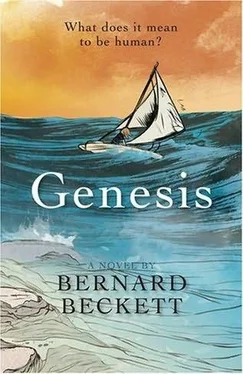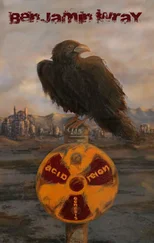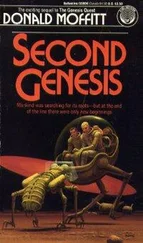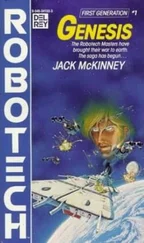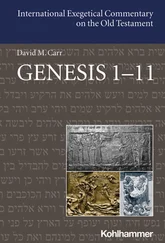Adam didn’t look like a traitor to them. He was a good- looking young man, with a disarming smile. He told the court that when he saw the young girl, floating hopelessly toward a line of explosives, he saw the sisters he would never know, the lovers he could not meet in public. He said he was led by his heart. He told them he had to do the thing that felt right. He told them the greater good could only be found by looking inside. He told them that one night in prison he had a dream of the Great Sea Fence tumbling down.
So the trial was a disaster for the Council. They had planned to end with a public execution, but by the second week it was clear that such a move could only end in riots. The Council was dangling from a noose of its own making when Philosopher William stepped forward.
It is important now to backtrack a little, if I may. Although Evolution Three had ended in disaster, and the public face of Artificial Intelligence research had ended, in private the program continued.
Many influential people still believed that The Republic could only be saved by the development of a new type of robot, one sufficiently advanced to be trusted with the chores of the Laborer and Soldier classes. They reasoned that it was only those at the bottom of the pile who had cause to rebel, and so a stable society would be one where no humans found themselves so low Aristotle, although not a leading exponent of this view, was at least open to its reasoning
Before I explain where Philosopher William’s research fits into this picture, let me explain briefly some of the technicalities. During its infancy, at least until the end of the twentieth century, the Artificial Intelligence industry had faced an imagination deficit. Because researchers wrongly assumed that their early computers were good models for the working of the brain, they persevered in programming thinking machines. It wasn’t until the second decade of this century, when the scientists and artists began working together, that they began to understand the nature of what we now call emergent complexity. “We cannot program a machine to think,” was the slogan of the pioneering firm Artfink, in which William learned his trade, “but we can program a machine to be programmed by thinking.”
It was still a huge leap from there to the point where they could begin to develop working models, and the early attempts were crude and mostly unsuccessful. However, Philosopher William, a genius in the field, had persevered. By the time of Adam’s trial, he was sure he had produced a new type of Artfink, one capable of developing genuine interactive intelligence.
Philosopher William’s problem was that, as with a child, this development required extensive human interaction. The Artfink needed a companion to watch, talk to, and learn from. Philosopher William had been secretly parenting his new prototype for over four years, and its development had exceeded all expectations.
Nevertheless, Philosopher William was afraid the progress of his prototype, whom he nicknamed Art (and from now on I shall follow him in this joke), might stall. He explained his fears in the following journal entry:
Although I have created Art, I do not understand it. This is the right and proper result of my research process. Art’s development has provided me with daily surprises, but lately I have noted the rate of surprise diminishing. That Art’s behavior has settled into a predictable pattern is not in itself alarming, it is after all what we would wish for any growing child. But my concern is the plateau has been reached too quickly. Perhaps I write this with the bias of a too-proud parent, but I am sure my invention is capable of achieving much more. The problem, as I see it, is that I who wrote the program am also charged with shaping its development. If Art no longer surprises me, it is in part surely because I no longer surprise Art. It is crucial he be exposed to an outside influence before his trimming and redirecting mechanisms shut down, and he becomes like a child deprived of stimulation, his curiosity left to wither. Sadly, after the nursery incident, finding a sufficiently agile volunteer for this process will be no easy matter.
Then Philosopher William watched the trial of Adam unfolding on livescreen, and he saw the perfect solution.
Philosopher William approached the Council and suggested that when it came to the sentencing, they frame a compromise. Adam should not be executed, nor indeed incarcerated under the normal conditions. Rather, he could be given the chance to make amends by making a unique contribution to his society. He could become Art’s full-time companion in a secure and controlled environment.
To Adam’s supporters, this would be presented as leniency, and an acknowledgment of Adam’s unique qualities. To his critics, the result would be presented as a prison term by any other name, and the risk involved would be exaggerated.
It is clear that in making his proposal, Philosopher William showed no particular concern for the future of The Republic. He was driven purely by his desire to see Art develop to his full potential before he, an old man by this time, died.
Adam was clearly a clever and provocative individual, exactly the stimulation Art needed, and even better, he was in no position to refuse. By the same token the Council, in considering Philosopher William’s proposal, spent little time thinking of the implications for the Artificial Intelligence program. Their sole criterion for making the decision was, “How well does this ladder we are being offered fit the hole in which we find ourselves?”
EXAMINER: And how did Adam feel about the proposal, when it was first put to him?
ANAXIMANDER: I believe his exact words were, “I like it far better than dying.”
The Head Examiner straightened without warning, and turned first to his colleague on the left, then to the one on the right. He nodded his head.
EXAMINER: So ends your second hour. I suggest another break.
The door slid open, and this time Anax left the room in better spirits. Telling the story to the Examiners felt no different to telling it to Pericles in one of their endless practice sessions.
There was no stranger in the waiting room this time and Anax was left with her thoughts, which turned naturally enough to her precious tutor and the time when they first met.
Anax had a favorite place, a ridge up above the city. She would often walk there after classes. Usually she went by herself. She wasn’t a loner; it was just that her friends were reluctant walkers. “You’re missing a great sunset,” she would message them, but the answer was always the same, “So download it.” The favored insult of that time.
It was during those final school years that Anax first began to realize she wasn’t like the others. She didn’t understand the careful nonchalance that appeared one day without warning, spreading through her classmates like the plague. It was as if a whole stage of development had passed her by.
She tried to explain it to her best friend, Thales. “I think there might be something wrong with me.”
“What do you mean?”
“I, well, I don’t think I’m like you. I like what we’re learning still. I don’t understand the things you talk about. The gossip. I enjoy the old days. I miss the games.”
“You’re just taking a bit longer to grow up,” Thales told her, sounding confident it would happen soon. Anax wasn’t so sure.
So each evening after class that summer, instead of rushing back to her apartment to plug into the group flashing — which to her had all the appeal of a passing electrical storm — she would detour up into the hills. It wasn’t just for the sunsets, although they grew more spectacular as the days lengthened and the northern haze extended. It was the breeze coming in off the sea. The feeling of standing at the edge of the world. It was the view. From the hilltops you could see the water sparkling silver, and dark against it the rusting outlines of the huge pylons, which had once supported the Great Sea Fence. To the west, the ruins of the Old City, overgrown and crumbling, being called back to the earth. A beautiful sight too, Anax thought, although she had never heard anyone else describe it that way.
Читать дальше
